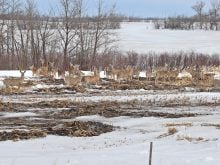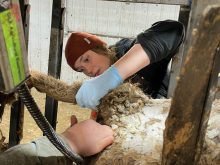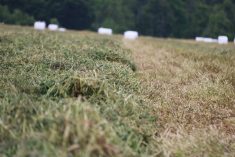Livestock leader | Page Stuart is the first woman elected as chair of the Alberta Cattle Feeders Association
RED DEER — A pivotal experience changed Page Stuart’s life when she decided to switch her university studies from English to animal science.
She saw a display from an animal rights group that condemned the raising of farm animals and knew she had to take a stand.
“I felt such a profound responsibility when I heard the information,” she said.
“Those of us in production agriculture are compelled morally to speak up.”
Recently elected as the first woman chair of the Alberta Cattle Feeders Association, she is poised to lead a 40-year-old organization that has experienced one of the largest price upswings in history.
Read Also

Feds propose overhaul of chronic wasting disease control program
Chronic Wasting disease control program getting updated by Canadian Food Inspection Agency with feedback encouraged from producers.
Raised on a mixed farm near Gibbons, Alta., she did not expect to make a career of working with livestock.
Her first job after earning a degree in animal science was with the Alberta Environmental Centre in Vegreville, where she worked for six years on cattle research. It is now the Alberta Research Council.
A serendipitous meeting at Toastmasters introduced her to Bern Kotelko, who owned Highland Feeders at Vegreville with his brother, Mike. They offered her a job, and in 1995 she started as a research assistant, eventually becoming general manager of one of the country’s most progressive operations.
The company feeds 36,000 cattle, runs a biogas plant and developed a branded beef product. It is a past winner of the Alberta Beef Producers enviornmental stewardship award.
Stuart worked side by side with the brothers to shepherd those projects from start to finish.
“They were terrific mentors to me and allowed me to live my passion for the industry,” she said.
Stuart left Highland in 2011 and is now with Elanco Animal Health, where she works with feedlots.
She completed a master’s degree in business from the University of Alberta during her time with Highland and started a family. Her two young children are now 4-H members and carry on a love of agriculture.
“It is so heartening to me to see them appreciate and understand what we do,” she said.
“They are always asking me what I do, and I like that they are connected to the industry and they share their stories with their friends.”
It never bothered her to be one of the few women in the room as she became more involved with the cattle feeders association, the Alberta Environmentally Sustainable Agriculture Council and Alberta’s intensive livestock working group. She has also chaired the Alberta Farm Safety Advisory Council and sat on the advisory committee to the Natural Re-sources Conservation Board, which grants permits to intensive livestock operations.
“The thought never occurred to me. I have always been the kind of person who, if there is an opportunity, I jump in with both feet,” she said.
Sitting on the cattle feeders board has been an exciting period for her as she works with like-minded people.
“They challenge my thinking,” she said. “They believe in what they are doing. They believe in the production of beef as essential to feeding the world.”
It has also been a tough 10 years for the cattle business, which has lost market access because of BSE embargoes, country-of-origin labeling in the United States, restricted trade and negligible profits.
“We have gone through some pretty challenging times in the last years,” she said.
The industry has contracted, but she believes Alberta is still the best place for cattle production. While the economic cycles are less predictable, she says the business will continue.
Another personal challenge and opportunity is to use her talents as a collaborator to draw the various livestock sectors and organizations closer together so they can all work toward the common goal of selling more beef.
















